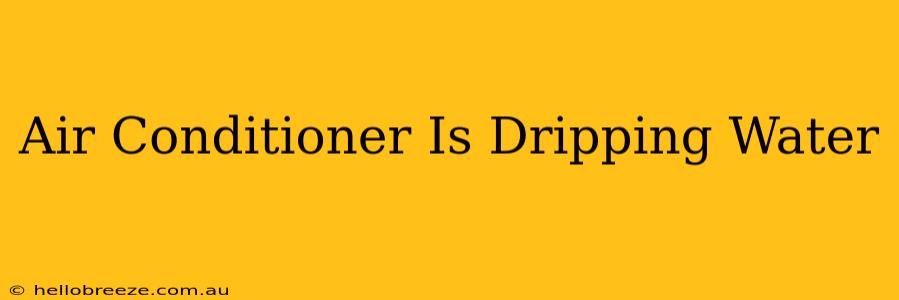Is your air conditioner dripping water? This common problem can be frustrating, but it's often fixable without calling a professional. This guide will walk you through the most frequent causes of air conditioner water leaks and provide simple solutions to get your system back to working efficiently.
Understanding Air Conditioner Drainage
Before diving into troubleshooting, it's important to understand how your AC's drainage system works. Air conditioners remove moisture from the air, and this moisture condenses into water. A properly functioning system will drain this water away through a condensate drain line. When this system malfunctions, water leaks result.
Common Causes of AC Water Leaks
Several factors can cause your air conditioner to drip water. Let's explore the most prevalent:
-
Clogged Drain Line: This is the most common culprit. Dust, dirt, algae, and other debris can accumulate in the drain line, blocking the flow of water. The result? Water backs up and overflows.
-
Frozen Evaporator Coil: A frozen evaporator coil restricts airflow, preventing proper melting of the ice and leading to water buildup and leaks. This is often caused by restricted airflow due to a dirty air filter, blocked vents, or a problem with the blower motor.
-
Dirty Air Filter: A clogged air filter reduces airflow, leading to a frozen evaporator coil and subsequent leaks. Regular filter changes are crucial for maintaining efficient AC operation.
-
Low Refrigerant: Insufficient refrigerant can cause the evaporator coil to freeze, leading to water leaks. This often requires professional attention.
-
Condensate Pump Malfunction: Some air conditioners use a condensate pump to remove water. If this pump fails, water will back up and leak.
-
Improper Installation: In some cases, leaks are due to improper installation of the unit or drain line.
Troubleshooting Your Leaky Air Conditioner
Now that we've identified the common causes, let's troubleshoot your specific situation:
1. Check the Air Filter
First and foremost, inspect your air filter. Is it dirty or clogged? If so, replace it with a clean one. This is a simple fix that often resolves the problem.
2. Inspect the Drain Line
Locate the condensate drain line (usually a PVC pipe). Carefully check for any visible blockages. You might need a flashlight to see inside the pipe. If you find debris, try using a wet/dry vacuum or compressed air to clear the line. For stubborn clogs, you may need a plumbing snake.
3. Examine the Evaporator Coil
Access the evaporator coil (usually located inside the air handler). Is it frozen? If so, this points to a problem with airflow. Check the air filter again (it might be even dirtier than you initially thought), examine your vents for blockages, and ensure the blower motor is functioning correctly. Allow the coil to thaw naturally; do not use excessive heat.
4. Check the Condensate Pump (if applicable)
If your AC has a condensate pump, listen for any unusual noises. If the pump isn't running, or sounds unusual, it might need repair or replacement. This often requires professional help.
5. Consider Professional Help
If you've checked all of the above and your air conditioner is still leaking, it's time to call an HVAC professional. Issues with refrigerant levels or improper installation require specialized knowledge and tools.
Preventing Future Leaks
Regular maintenance is key to preventing future air conditioner leaks:
- Change your air filter regularly. (Aim for every 1-3 months, depending on usage and filter type).
- Schedule annual professional maintenance. This ensures your system is functioning optimally.
- Keep the area around your air conditioner clean and clear. This prevents debris from blocking the drain line.
By following these tips, you can often resolve a leaky air conditioner yourself. However, remember that some issues require professional assistance. Don't hesitate to contact a qualified HVAC technician if you're unsure about anything. A little preventative maintenance goes a long way in keeping your air conditioner running smoothly and drip-free!

